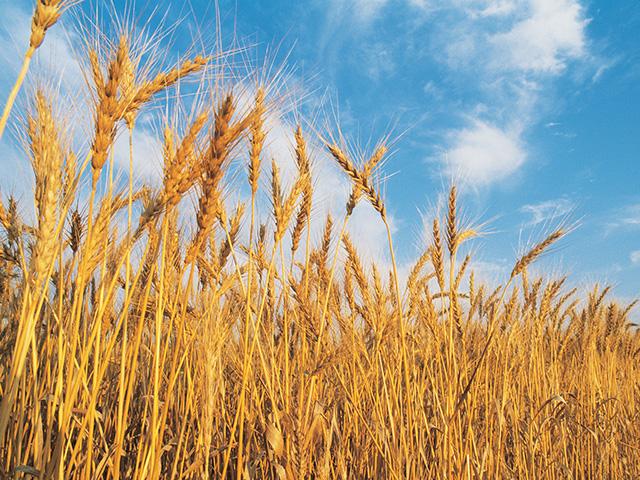USDA Gives GM Wheat the Green Light
Drought-Tolerant Biotech Wheat Approved for Cultivation in the United States
JEFFERSON CITY, Mo. (DTN) -- HB4 wheat, a drought-tolerant genetically modified wheat variety, can be safely grown and bred in the United States, according to the USDA Animal and Plant Health Inspection Service (APHIS). The agency's determination makes the U.S. the fourth country in the world to green-light production of HB4 wheat, following Argentina, Brazil and Paraguay.
In an Aug. 27 letter posted to the APHIS Regulatory Status Review Table, APHIS Deputy Administrator for Biotechnology Regulatory Services Bernadette Juarez wrote the agency had completed its review of the wheat technology and "did not identify any plausible pathway" by which HB4 wheat posed an increased plant pest risk relative to other cultivated plants.
"Once APHIS determines that a plant product is unlikely to pose an increased plant pest risk relative to its comparator, and, thus, is not a plant pest or a plant that requires regulation because it is capable of introducing or disseminating a plant pest, APHIS has no authority to regulate it under 7 CFR part 340," Juarez wrote of the regulations for organisms modified or produced through genetic engineering. "Accordingly, your wheat is not subject to the regulations under 7 CFR part 340."
APHIS' determination for HB4 extends to any progeny of the modified plant that is derived from crosses with other nonmodified plants or other modified plants that are also not subject to the regulations in 7 CFR part 340.
WHEAT WITH LESS WATER
As a GM crop, HB4 wheat contains HaHB4, a transcription factor isolated from sunflower that modulates the expression of several hundred genes providing drought tolerance. In the face of drought, HB4 generates more antioxidant and osmoprotectant molecules, delaying cellular deterioration and allowing the plant to maintain photosynthesis until rain returns. HB4 wheat also is tolerant to glufosinate herbicide.
In an interview with DTN earlier this year, Martin Mariani Ventura, global seeds and traits manager at Bioceres, said data from three seasons of field trials in 34 different locations in Argentina showed that when environmental conditions limited yield to less than 30 bushels per acre (bpa), varieties with HB4 technology yielded 38% more on average than the same wheat variety without the technology. The increase was even more pronounced -- 51% more on average -- when looking at data from 2022-23, a season during which Argentina suffered through a major drought.
P[L1] D[0x0] M[300x250] OOP[F] ADUNIT[] T[]
"Even in a nonlimitation environment, where yields exceed 60 bpa, the varieties with HB4 yielded 23% more on average than the same varieties without it," he said. "From the grower perspective, this is important because it means the technology works when there is a drought situation, but it also doesn't cause a yield drag when there is no drought."
INDUSTRY REACTION
Both the National Association of Wheat Growers (NAWG) and U.S. Wheat Associates (USW) released statements commending APHIS for clearing a pathway for cultivating HB4 wheat in the U.S. However, it still will take years for Bioceres to complete the steps necessary to successfully commercialize the trait for North America, said Peter Laudeman, USW director of trade policy, in a statement from the organization.
"There is still a lot of ground to cover with this technology, and our organization will stay actively engaged in the process on behalf of our farmers and overseas customers," Laudeman said. "We appreciate the commitment that Bioceres is making to working with its wheat industry partners to ensure robust stewardship of this technology prior to commercial release."
In 2008, NAWG and USW adopted the "Wheat Industry Principles for Biotechnology Commercialization," which outline how transgenic wheat traits should be commercialized to best meet the U.S. wheat industries' needs. Essentially, any trait coming to market needs to do so in a way that benefits the U.S. wheat producer and doesn't disrupt markets unnecessarily. The technology provider must also seek and receive regulatory approval in key U.S. wheat exports markets, which have been defined as those representing at least 5% of normal export volume based on the five-year average.
"As a wheat grower who has experienced drought firsthand, it is exciting to see a regulatory pathway where drought-tolerant wheat might be available to producers in the future," said Oklahoma wheat farmer and NAWG President Keeff Felty in a statement. "Over the past few years, wheat producers across the major wheat-producing regions have had to grapple with intense drought, and continued innovations like HB4 can be a tool that helps growers protect and stabilize their yields."
"Wherever wheat is grown in the world, drought takes its toll on yields and quality, so an innovation like HB4 holds a lot of interest for growers like me," said Michael Peters, USW past chairman and Oklahoma wheat grower. "With global demand for wheat hitting new records almost every year, there is concern about variable production. A drought-tolerant trait offers more stable, sustainable production. At the same time, it is important that customers who have specific purchase preferences understand the industry supports their ability to purchase the type of wheat they want. That remains our policy after more than 16 years."
In its press release, Bioceres said the company will provide further details on its HB4 wheat platform during its upcoming earnings call on Sept. 10.
Read more from DTN on HB4 Wheat:
-- "Genetically Modified Wheat Could Provide Drought Relief," https://www.dtnpf.com/…
-- "Brazil Gives GM Wheat the Green Light," https://www.dtnpf.com/…
-- "Bioceres Touts FDA's GM Wheat Review," https://www.dtnpf.com/…
Jason Jenkins can be reached at jason.jenkins@dtn.com
Follow him on social platform X @JasonJenkinsDTN
(c) Copyright 2024 DTN, LLC. All rights reserved.






